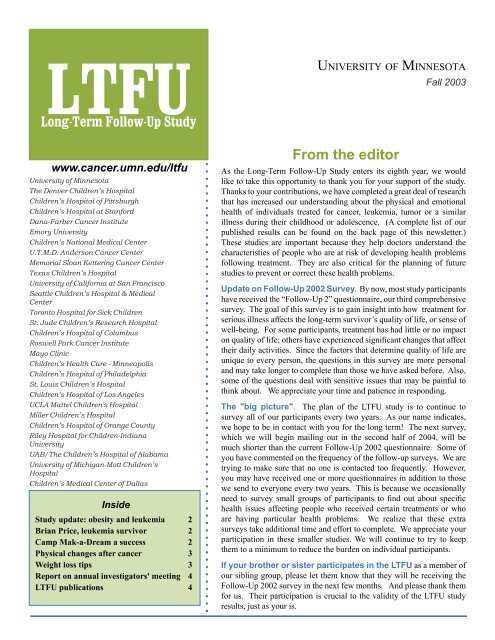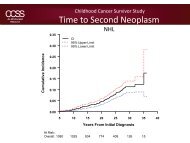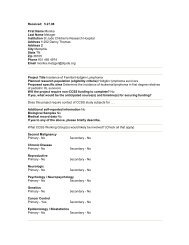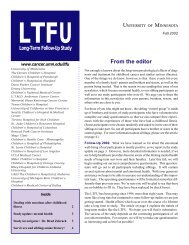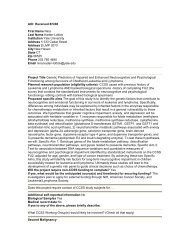LTFU - Childhood Cancer Survivor Study - St. Jude Children's ...
LTFU - Childhood Cancer Survivor Study - St. Jude Children's ...
LTFU - Childhood Cancer Survivor Study - St. Jude Children's ...
Create successful ePaper yourself
Turn your PDF publications into a flip-book with our unique Google optimized e-Paper software.
<strong>LTFU</strong><br />
Long-Term Follow-Up <strong><strong>St</strong>udy</strong><br />
UNIVERSITY OF MINNESOTA<br />
Fall 2003<br />
www.cancer.umn.edu/ltfu<br />
University of Minnesota<br />
The Denver Children’s Hospital<br />
Children’s Hospital of Pittsburgh<br />
Children’s Hospital at <strong>St</strong>anford<br />
Dana-Farber <strong>Cancer</strong> Institute<br />
Emory University<br />
Children’s National Medical Center<br />
U.T.M.D. Anderson <strong>Cancer</strong> Center<br />
Memorial Sloan Kettering <strong>Cancer</strong> Center<br />
Texas Children’s Hospital<br />
University of California at San Francisco<br />
Seattle Children’s Hospital & Medical<br />
Center<br />
Toronto Hospital for Sick Children<br />
<strong>St</strong>. <strong>Jude</strong> Children’s Research Hospital<br />
Children’s Hospital of Columbus<br />
Roswell Park <strong>Cancer</strong> Institute<br />
Mayo Clinic<br />
Children’s Health Care - Minneapolis<br />
Children’s Hospital of Philadelphia<br />
<strong>St</strong>. Louis Children’s Hospital<br />
Children’s Hospital of Los Angeles<br />
UCLA Mattel <strong>Children's</strong> Hospital<br />
Miller Children’s Hospital<br />
Children’s Hospital of Orange County<br />
Riley Hospital for Children-Indiana<br />
University<br />
UAB/The Children’s Hospital of Alabama<br />
University of Michigan-Mott Children’s<br />
Hospital<br />
Children’s Medical Center of Dallas<br />
Inside<br />
<strong><strong>St</strong>udy</strong> update: obesity and leukemia 2<br />
Brian Price, leukemia survivor 2<br />
Camp Mak-a-Dream a success 2<br />
Physical changes after cancer 3<br />
Weight loss tips 3<br />
Report on annual investigators' meeting 4<br />
<strong>LTFU</strong> publications 4<br />
From the editor<br />
As the Long-Term Follow-Up <strong><strong>St</strong>udy</strong> enters its eighth year, we would<br />
like to take this opportunity to thank you for your support of the study.<br />
Thanks to your contributions, we have completed a great deal of research<br />
that has increased our understanding about the physical and emotional<br />
health of individuals treated for cancer, leukemia, tumor or a similar<br />
illness during their childhood or adolescence. (A complete list of our<br />
published results can be found on the back page of this newsletter.)<br />
These studies are important because they help doctors understand the<br />
characteristics of people who are at risk of developing health problems<br />
following treatment. They are also critical for the planning of future<br />
studies to prevent or correct these health problems.<br />
Update on Follow-Up 2002 Survey. By now, most study participants<br />
have received the “Follow-Up 2” questionnaire, our third comprehensive<br />
survey. The goal of this survey is to gain insight into how treatment for<br />
serious illness affects the long-term survivor’s quality of life, or sense of<br />
well-being. For some participants, treatment has had little or no impact<br />
on quality of life; others have experienced significant changes that affect<br />
their daily activities. Since the factors that determine quality of life are<br />
unique to every person, the questions in this survey are more personal<br />
and may take longer to complete than those we have asked before. Also,<br />
some of the questions deal with sensitive issues that may be painful to<br />
think about. We appreciate your time and patience in responding.<br />
The "big picture". The plan of the <strong>LTFU</strong> study is to continue to<br />
survey all of our participants every two years. As our name indicates,<br />
we hope to be in contact with you for the long term! The next survey,<br />
which we will begin mailing out in the second half of 2004, will be<br />
much shorter than the current Follow-Up 2002 questionnaire. Some of<br />
you have commented on the frequency of the follow-up surveys. We are<br />
trying to make sure that no one is contacted too frequently. However,<br />
you may have received one or more questionnaires in addition to those<br />
we send to everyone every two years. This is because we occasionally<br />
need to survey small groups of participants to find out about specific<br />
health issues affecting people who received certain treatments or who<br />
are having particular health problems. We realize that these extra<br />
surveys take additional time and effort to complete. We appreciate your<br />
participation in these smaller studies. We will continue to try to keep<br />
them to a minimum to reduce the burden on individual participants.<br />
If your brother or sister participates in the <strong>LTFU</strong> as a member of<br />
our sibling group, please let them know that they will be receiving the<br />
Follow-Up 2002 survey in the next few months. And please thank them<br />
for us. Their participation is crucial to the validity of the <strong>LTFU</strong> study<br />
results, just as your is.
<strong><strong>St</strong>udy</strong> update:<br />
Obesity and leukemia<br />
<strong>LTFU</strong> researchers have published results of a new study of<br />
obesity in adults who were treated for acute lymphoblastic<br />
leukemia as children. Dr. Kevin Oeffinger of the University<br />
of Texas Southwestern Medical Center in Dallas led the research<br />
team. The study compared 1765 leukemia survivors<br />
who are participants in the <strong>LTFU</strong> with 2565 siblings (brothers<br />
and sisters) of study participants.<br />
The research team found that children who were treated with<br />
doses of more than 20 Gy of radiation to the brain had an<br />
increased chance of being overweight or obese in adulthood,<br />
compared to individuals in the sibling group. Girls diagnosed<br />
before age 4 who received this dosage were at the highest risk.<br />
More than half were overweight or obese as adults.<br />
The researchers also found that the older a person was at<br />
diagnosis, the less likely he or she was to be obese in adulthood.<br />
In fact, leukemia survivors who were 15 years old or<br />
older when diagnosed did not have an increased chance of<br />
being overweight, no matter what treatment they received for<br />
their leukemia. Chemotherapy treatment did not increase the<br />
chances of obesity for any age or treatment group.<br />
The research team used a tool called the Body Mass Index<br />
(BMI) to discover which participants in the study were overweight.<br />
The BMI is calculated from a person's height and<br />
weight. According to the U.S. National Heart, Lung, and<br />
Blood Institute, a BMI of 25 to 29.9 indicates that a person<br />
is overweight. A BMI of 30 or higher is the Institute's standard<br />
for obesity. If you would like to learn more about the<br />
Body Mass Index you can visit the Institute's website at the<br />
following location:<br />
www.nhlbi.nih.gov/guidelines/obesity/ob_home.htm<br />
This site has a link to a BMI calculator where you can calculate<br />
your own BMI. Obesity is becoming a serious problem for<br />
more and more people. Whether or not you were treated for<br />
leukemia, if you are overweight it is important to know<br />
that losing weight, and especially increasing your activity,<br />
can help reduce your risk of diabetes, high blood pressure,<br />
heart disease, and other life-threatening conditions. The<br />
website listed above has information to help you assess<br />
your risk of getting these types of diseases. It also provides<br />
useful information on achieving and maintaining<br />
a healthy body weight. On the next page, Dr. Melissa<br />
Hudson of <strong>St</strong>. <strong>Jude</strong> <strong>Children's</strong> Research Hospital offers<br />
advice for adjusting to physical changes such as weight<br />
gain after experiencing a serious illness.<br />
The paper "Obesity in Adult <strong>Survivor</strong>s of <strong>Childhood</strong><br />
Acute Lymphoblastic Leukemia" can be found in the Journal<br />
of Clinical Oncology, Vol. 21, No. 7 (April 1), 2003, pages<br />
1359-1365.<br />
2<br />
Brian Price, world champion<br />
<strong><strong>St</strong>udy</strong> participant Brian Price is a member of the world champion<br />
Canadian National Rowing team. He writes below about<br />
how surviving cancer contributed to his accomplishment.<br />
At the age of 7, I<br />
was diagnosed with<br />
acute lymphoblastic<br />
leukemia. At that<br />
young age, it is a<br />
difficult thing to<br />
understand and put<br />
into perspective. I<br />
just remember my<br />
mother telling me<br />
that I had to have<br />
these needles and<br />
take these drugs so Brian (front row, left) and his teammates<br />
that I could live. Going<br />
to the hospital, knowing when I would be sick, having no<br />
energy, keeping away from friends with a cold, all this became<br />
routine. Upon reaching age 12 I was officially in remission.<br />
My battle with cancer was over but it didn't go away without<br />
leaving a long-term influence on my life.<br />
By having to endure all the chemotherapy and rounds of drugs,<br />
only 50 percent of my thyroid was functional. For a kid who<br />
continued on page 4<br />
Camp Mak-a-Dream<br />
The first annual Young Adult <strong>Survivor</strong>s Camping Conference<br />
was held at Camp Mak-A-Dream in Gold Creek, Montana this<br />
August. The conference was presented through a partnership<br />
with the Lance Armstrong Foundation. It was cost-free and<br />
open to cancer survivors age 20 to 39. Several of our participants<br />
attended the event, which was advertised in the Spring<br />
2003 <strong>LTFU</strong> newsletter. <strong><strong>St</strong>udy</strong> investigators Dr. Brad Zebrack<br />
and Dr. Kevin Oeffinger led workshops at the camp.<br />
The theme of the conference<br />
was advocacy. Participants<br />
learned to advocate<br />
for themselves, others, and<br />
society. The conference included<br />
sessions that focused<br />
on skills such as networking,<br />
becoming a mentor, public<br />
speaking, and establishing<br />
productive relationships between<br />
survivors and health<br />
care providers. Between<br />
sessions there was plenty of time for more traditional camping<br />
activities like hiking, fishing, and relaxing in a hot tub.<br />
A second camping conference is planned for Spring 2004.<br />
For more details, call the camp at 406-549-5987.
Physical changes after cancer and similar illnesses<br />
by Dr. Melissa Hudson<br />
Most people who have had cancer or a similar serious illness<br />
go through physical changes of some sort during therapy.<br />
Among the most common of these are weight changes,<br />
including weight loss associated with nutritional problems<br />
and weight gain associated with steroid medications like<br />
prednisone and dexamethasone. After completing therapy<br />
and going back to their regular physical activity, most<br />
people return to their usual weight. However, treatment<br />
may increase the risk of obesity in adulthood for some<br />
individuals. <strong>Survivor</strong>s of bone and muscle tumors may<br />
have functional problems or chronic pain after surgery that<br />
limits their physical activity. Some survivors experience<br />
decreased stamina and chronic fatigue that reduce their<br />
desire to exercise regularly. Radiation effects on hormoneproducing<br />
glands like the pituitary and thyroid may affect<br />
growth, metabolism, body fat distribution, and energy<br />
level. These treatment-related effects may be made worse<br />
by poor dietary habits and an inactive lifestyle. Usually,<br />
a combination of cancer-related factors and health habits<br />
is the most common explanation for obesity. Changing<br />
health habits can dramatically reduce the risk of obesity and<br />
obesity-related health problems.<br />
Obesity has been linked to several common adult health<br />
problems, including diabetes mellitus, high blood pressure,<br />
high cholesterol, and heart disease. In addition, obesity has<br />
been associated with higher rates of uterine, breast, and<br />
colon cancer. Improved understanding about how cancer<br />
treatment causes obesity helps doctors plan therapies that<br />
avoid this problem in future childhood cancer patients and<br />
interventions to help long-term childhood cancer survivors<br />
stay healthy as they get older. The recent report by Dr.<br />
Oeffinger describing obesity in survivors of childhood acute<br />
lymphoblastic leukemia shows that treatment with higher<br />
radiation doses of (20 Gy or more ) to the brain, especially<br />
in girls younger than 4 years, is associated with a greater<br />
chance of being obese as an adult. Radiation may cause<br />
obesity by affecting the hypothalamus, a gland in the brain<br />
that regulates the body’s energy use and the “fullness” you<br />
typically feel after eating a meal. Radiation effects on the<br />
production of growth hormone by the pituitary gland in the<br />
brain may also play a role in obesity after childhood cancer.<br />
Early results from the <strong>LTFU</strong> "Scope" mouthwash study show<br />
a relationship between genetic factors and treatment in the<br />
risk of obesity in girls with ALL. Until the effects of cancer<br />
treatment on weight control are better understood, doctors<br />
are trying to prevent this problem in childhood cancer<br />
patients by using treatments other than brain radiation, if<br />
at all possible. Presently, practicing a healthy lifestyle is<br />
the best way for survivors who received obesity-promoting<br />
treatments to maintain a healthy weight.<br />
<strong>Survivor</strong>s of childhood cancer and similar illnesses should<br />
realize that they are not alone in their battle against obesity.<br />
Poor nutritional habits and changes in recreational activities<br />
have been linked to an alarming increase in the rate of obesity<br />
in the general population. More meals are eaten outside<br />
the home and include foods that are higher in calories and<br />
fat. Restaurants serve larger portions that promote overeating.<br />
Soft drinks and snack foods that are high in sugar,<br />
salt, and fat make up an increasing portion of the average<br />
daily intake instead of fruits and vegetables. Unfortunately,<br />
this increased intake of dietary calories and fat has not been<br />
balanced by greater physical activity. Instead, more time<br />
is spent in sedentary recreational activities like watching<br />
television, playing video games, and surfing the Internet.<br />
Making lifestyle changes to correct or prevent obesity is<br />
one of the most important steps a person can take to stay<br />
healthy. These efforts are more likely to be successful if<br />
the entire family commits to eating healthier and becoming<br />
more physically active. Specific health-promoting<br />
recommendations are listed below.<br />
If you'd like to lose weight. . .<br />
Set specific goals for diet and exercise<br />
• Example, “Walk 30 minutes 5 days a week”<br />
Keep a food and activity journal.<br />
• This can be a great motivator.<br />
Think “slow food”<br />
• Practice eating slowly to allow time for your brain to get the<br />
message you’ve been fed<br />
• Try to establish regular meal times<br />
• Home-cooked food tastes great and is often more nutritious<br />
and less fattening than fast food<br />
Make healthy substitutions<br />
• Try sherbet – or watermelon! – instead of ice cream<br />
• Serve pasta with veggies instead of cheese sauce<br />
Read nutrition labels<br />
• Become familiar with serving sizes and calories per serving<br />
as well as servings per container.<br />
• Remember that some of the best food choices – fresh<br />
fruits and veggies -- don’t always come with nutrition labels<br />
Find some partners<br />
• Exercise with a friend<br />
• Check out weight loss programs such as Weight Watchers<br />
• Use community resources - workplace facilities, community<br />
education programs, YMCA/YWCA<br />
• Talk to your doctor<br />
3
continued from page 2<br />
wanted to be 6'4', the outlook was not good. Actually, this was<br />
the best thing that could have happened to me. I have been<br />
able to take this misfortune and turn it into an international<br />
rowing career.<br />
No, I didn't suddenly become 6'4" tall, but I do get to tell guys<br />
that size what to do. At 5'4" tall, 120 pounds, I am the coxwain<br />
of the Canadian National Rowing team, with my crew being<br />
twice World Champion in men's eight-man competition. The<br />
coxwain (a.k.a., cox) is the guy who sits at the back of the boat<br />
to steer and makes calls to the rowers in front of him. My<br />
journey from cancer to cox has been many years evolving. I<br />
started rowing in 1995 with my first national team appearance<br />
being in 1998. By 2000 I was ranked number two coxwain in<br />
Canada and then secured the number one job in 2001, which<br />
I hold to this day.<br />
To win the World championships two years in a row is certainly<br />
exciting, but winning my battle with cancer has always<br />
been the most important achievement of my life. My years<br />
rowing have not always been easy, but whenever I've hit a<br />
rough patch I have often reflected back to my childhood. I<br />
think about all the time, effort, and sacrifice that my parents,<br />
family, and friends went through, and I row for them. It's<br />
just the motivation that I need to get me back focusing on the<br />
opportunity to prove myself as a champion.<br />
It may sound odd to hear, but without cancer my life would not<br />
be where it is today. I would never wish to turn back time and<br />
have it play out a different way. <strong>Cancer</strong> helped me become<br />
a two-time world champion, and I hope that it will help me<br />
become an Olympic champion next year in Athens.<br />
Annual Investigators' Meeting<br />
<strong>LTFU</strong> investigators held their annual meeting at the University<br />
of Minnesota <strong>Cancer</strong> Center in Minneapolis on May 17-18,<br />
2003. Researchers from<br />
all 28 participating U.S.<br />
and Canadian institutions<br />
attended. They discussed<br />
the current state<br />
of research and presented<br />
proposals for several new<br />
research projects.<br />
Dr. Les Robison, <strong>LTFU</strong><br />
principal investigator,<br />
University of Minnesota <strong>Cancer</strong> Center presented a proposal for<br />
expanding the study cohort<br />
to include individuals who were diagnosed with childhood<br />
cancer or a similar illness between 1987 and 1999.<br />
The <strong>LTFU</strong> study currently includes individuals who were<br />
diagnosed between 1970 and 1986.<br />
A list of <strong>LTFU</strong> study publications is at right.<br />
<strong>LTFU</strong> Published Research<br />
Oeffi nger KC, et al. Obesity in Adult <strong>Survivor</strong>s of <strong>Childhood</strong><br />
Acute Lymphoblastic Leukemia. J Clin Oncol 21:1359-65,<br />
2003.<br />
Mitby PA, et al. Utilization of Special Education Services<br />
and Educational Atainment among Long-Term <strong>Survivor</strong>s of<br />
<strong>Childhood</strong> <strong>Cancer</strong>. <strong>Cancer</strong> 97:1115-26, 2003.<br />
Gurney JG, et al. Endocrine and cardiovascular late effects<br />
among adult survivors of childhood brain tumors. <strong>Cancer</strong> 97:<br />
663-73, 2003.<br />
Green DM, et al. Pregnancy Outcome of Partners of Male<br />
<strong>Survivor</strong>s of <strong>Childhood</strong> <strong>Cancer</strong>. J Clin Oncol 21:716-21, 2003.<br />
Emmons K, et al. Smoking Among Participants in the <strong>Childhood</strong><br />
<strong>Cancer</strong> <strong>Survivor</strong>s Cohort: The Partnership for Health <strong><strong>St</strong>udy</strong>. J<br />
Clin Oncol 21:189-96, 2003.<br />
Zebrack BJ, et al. Psychological Outcomes in Long-Term<br />
<strong>Survivor</strong>s of <strong>Childhood</strong> Leukemia, Hodgkin’s Disease and non-<br />
Hodgkin’s Lymphoma. Pediatrics, 110:42-52, 2002.<br />
Sklar CA, et al. Risk of Disease Recurrence and Second<br />
Neoplasms in <strong>Survivor</strong>s of <strong>Childhood</strong> <strong>Cancer</strong> Treated with<br />
Growth Hormone. J Clin Endocrinol Metab 87:3136-3141,<br />
2002.<br />
Robison LL, et al. <strong><strong>St</strong>udy</strong> Design and Cohort Characteristics of<br />
the <strong>Childhood</strong> <strong>Cancer</strong> <strong>Survivor</strong><br />
<strong><strong>St</strong>udy</strong>: A Multi-Institutional Collaborative Project. Med Pediatr<br />
Oncol 38:229-39, 2002.<br />
Mertens AC, et al. Pulmonary Complications in <strong>Survivor</strong>s of<br />
<strong>Childhood</strong> and Adolescent <strong>Cancer</strong>. <strong>Cancer</strong> 95:2431-41,2002.<br />
Kadan-Lottick NS, et al. What Do <strong>Childhood</strong> <strong>Cancer</strong> <strong>Survivor</strong>s<br />
Know about Their Past Diagnosis and Treatment? The<br />
<strong>Childhood</strong> <strong>Cancer</strong> <strong>Survivor</strong> <strong><strong>St</strong>udy</strong>. JAMA 287:1832-9, 2002.<br />
Green DM, et al. Pregnancy Outcome of Female <strong>Survivor</strong>s of<br />
<strong>Childhood</strong> <strong>Cancer</strong>. Am J Obst Gynecol 187:1070-1080, 2002.<br />
Emmons K, et al. Predictors of Smoking Initiation and<br />
Cessation among <strong>Childhood</strong> <strong>Cancer</strong> <strong>Survivor</strong>s. J Clin Oncol<br />
20:1608-16, 2002.<br />
Neglia JP, et al. Second Malignant Neoplasms in Five-Year<br />
<strong>Survivor</strong>s of <strong>Childhood</strong> <strong>Cancer</strong>. J Natl <strong>Cancer</strong> Inst 93:618-29,<br />
2001.<br />
Mertens A, et al. Late Mortality Experience in Five-Year<br />
<strong>Survivor</strong>s of <strong>Childhood</strong> and Adolescent <strong>Cancer</strong>. J Clin Oncol<br />
19:3163-72, 2001.<br />
Sklar C, et al. Abnormalities of the Thyroid in <strong>Survivor</strong>s of<br />
Hodgkin’s Disease. J Clin Endocrinol Metab 85:3227-32,<br />
2000.<br />
Rauck AM, et al. Marriage in the <strong>Survivor</strong>s of <strong>Childhood</strong><br />
<strong>Cancer</strong>. Med Pediatr Oncol 33:60-3, 1999.<br />
<strong>LTFU</strong> study toll-free phone number:<br />
1-800-775-2167<br />
4


